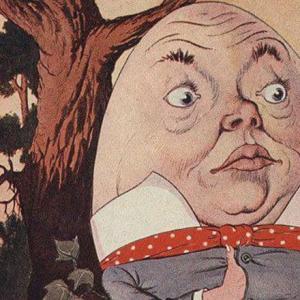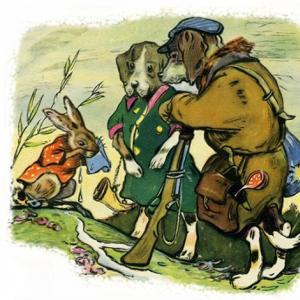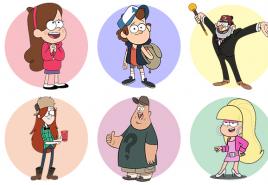"Town in a Snuffbox" are the main characters. Fairy tale town in a snuffbox City in a snuffbox author
Papa put a snuffbox on the table. “Come here, Misha, take a look,” he said. Misha was an obedient boy; immediately left the toys and went to papa. And there was something to see! What a lovely snuffbox! Motley, from a turtle. And what's on the lid! Gates, turrets, a house, another, a third, a fourth, - and it is impossible to count, and everything is small less, and all are golden, and the trees are also golden, and the leaves on them are silver; and the sun rises behind the trees, and from it pink rays spread throughout the sky.
- What is this town? - Misha asked.
- This is the town of Tinker Bell, - answered papa and touched the spring ...
And what? Suddenly, invisibly where, music began to play. Where this music was heard from, Misha could not understand: he also walked to the door - was it not from another room? and to the clock - isn't it in the clock? both to the office and to the slide; I listened in one place or another; and looked under the table ... Finally, Misha was sure that the music was definitely playing in the snuffbox. He went up to her, looked, and from behind the trees the sun came out, sneaking quietly across the sky, and the sky and the town were brighter and brighter; the windows burn with bright fire, and the turrets seem to shine. Now the sun crossed the sky to the other side, lower and lower, and finally disappeared behind the hillock; and the town darkened, the shutters closed, and the turrets faded, but not for long. An asterisk began to glow, another one, and a horned moon looked out from behind the trees, and the town became brighter again, the windows were silvery, and bluish rays stretched out from the turrets.
- Daddy! papa! is it possible to enter this town? How I wish!
“It’s tricky, my friend: this town is not your size.
- Nothing, papa, I'm so small; just let me go there; I would so much like to know what is going on there ...
“Really, my friend, it’s cramped there without you.
- Who lives there?
- Who lives there? Bells live there.
With these words, papa lifted the lid on the snuff-box, and what did Misha see? And bells, and hammers, and a roller, and wheels ... Misha was surprised. “Why are these bells? why hammers? why a roller with hooks? " - Misha asked papa.
And papa answered: “I won't tell you, Misha; Take a closer look yourself and think: maybe you will guess. Only don't touch this spring, otherwise everything will break. "
Papa went out, and Misha remained over the snuffbox. So he sat and sat over her, looked and looked, thought and thought, why are the bells ringing?
Meanwhile the music plays and plays; everything is quieter and quieter, as if something is clinging to each note, as if something pushes one sound away from another. Here Misha looks: at the bottom of the snuff box the door opens, and a boy with a gold head and a steel skirt runs out of the door, stops on the threshold and beckons Misha to him.
“But why,” thought Misha, “did papa say that this town is cramped even without me? No, apparently good people live in it, you see, they invite me to visit. "
- Excuse me, with the greatest joy!
With these words, Misha ran to the door and was surprised to notice that the door was exactly the same height. As a well-mannered boy, he considered it his duty first of all to turn to his guide.
- Let me find out, - said Misha, - with whom I have the honor to speak?
Children's curiosity sometimes knows no boundaries, and adults find it difficult to find an explanation of how and what works. Moreover, this must be done in a fun way so that the child does not get bored and he retains an interest in learning. The tale of Vladimir Odoevsky "The Town in the Snuffbox" is an unusual scientific and artistic work that tells children about the construction of a musical snuffbox.
Once the father showed the boy Misha a beautiful tortoiseshell snuff-box on which a beautiful city was painted. Beautiful music poured from the snuff-box, and changes took place in the city to its sounds. Misha wanted to know how this unusual city works, how music is made, how this mechanism works. Daddy invited him to think about it. Misha found himself in the city where the bells live, learned that they were not alone there, that their work depended on something else. He made an amazing journey and was able to understand how the snuff box is arranged inside, and then realized that he had all this in a dream.
This tale not only tells about the mechanisms hidden inside the snuffbox, it also shows the children that not everything is simple. Sometimes there is a whole chain of actions in which the next action depends on the previous one. Children learn to understand this and learn other things with interest.
On our site you can download the book "Town in a Snuffbox" Odoevsky Vladimir Fedorovich free of charge and without registration in epub, fb2, pdf format, read the book online or buy a book in the online store.
Papa put a snuffbox on the table. “Come here, Misha, take a look,” he said. Misha was an obedient boy; immediately left the toys and went to papa. And there was something to see! What a lovely snuffbox! Motley, from a turtle. And what's on the lid! Gates, turrets, a house, another, a third, a fourth, - and it is impossible to count, and everything is small less, and all are golden, and the trees are also golden, and the leaves on them are silver; and the sun rises behind the trees, and from it pink rays spread throughout the sky.
- What is this town? - Misha asked.
- This is the town of Tinker Bell, - answered papa and touched the spring ...
And what? Suddenly, invisibly where, music began to play. Where this music was heard from, Misha could not understand: he also walked to the door - was it not from another room? and to the clock - isn't it in the clock? both to the office and to the slide; I listened in one place or another; and looked under the table ... Finally, Misha was sure that the music was definitely playing in the snuffbox. He went up to her, looked, and from behind the trees the sun came out, sneaking quietly across the sky, and the sky and the town were brighter and brighter; the windows burn with bright fire, and the turrets seem to shine. Now the sun crossed the sky to the other side, lower and lower, and finally disappeared behind the hillock; and the town darkened, the shutters closed, and the turrets faded, but not for long. An asterisk began to glow, another one, and a horned moon looked out from behind the trees, and the town became brighter again, the windows were silvery, and bluish rays stretched out from the turrets.
- Daddy! papa! is it possible to enter this town? How I wish!
“It’s tricky, my friend: this town is not your size.
- Nothing, papa, I'm so small; just let me go there; I would so much like to know what is going on there ...
“Really, my friend, it’s cramped there without you.
- Who lives there?
- Who lives there? Bells live there.
With these words, papa lifted the lid on the snuff-box, and what did Misha see? And bells, and hammers, and a roller, and wheels ... Misha was surprised. “Why are these bells? why hammers? why a roller with hooks? " - Misha asked papa.
And papa answered: “I won't tell you, Misha; Take a closer look yourself and think: maybe you will guess. Only don't touch this spring, otherwise everything will break. "
Papa went out, and Misha remained over the snuffbox. So he sat and sat over her, looked and looked, thought and thought, why are the bells ringing?
Meanwhile the music plays and plays; everything is quieter and quieter, as if something is clinging to each note, as if something pushes one sound away from another. Here Misha looks: at the bottom of the snuff box the door opens, and a boy with a gold head and a steel skirt runs out of the door, stops on the threshold and beckons Misha to him.
“But why,” thought Misha, “did papa say that this town is cramped even without me? No, apparently good people live in it, you see, they invite me to visit. "
- Excuse me, with the greatest joy!
With these words, Misha ran to the door and was surprised to notice that the door was exactly the same height.
As a well-mannered boy, he considered it his duty first of all to turn to his guide.
- Let me find out, - said Misha, - with whom I have the honor to speak?
- Ding-ding-ding, - answered the stranger, - I am a bell boy, a resident of this town. We heard that you really want to visit us, and therefore decided to ask you to do us the honor to welcome us. Ding-ding-ding, ding-ding-ding.
Misha bowed politely; the bell boy took his hand and they went. Then Misha noticed that above them was a vault made of motley embossed paper with gold edges. Before them was another vault, only smaller; then a third, even less; the fourth, even smaller, and so all the other vaults - the further, the smaller, so that the last, it seemed, could hardly pass the head of his guide.
“I am very grateful to you for your invitation,” Misha told him, “but I don’t know if I can use it. True, here I can freely walk, but there, further, look at what low vaults you have - there I, let me tell you frankly, there I won't even crawl. I am surprised how you pass under them.
- Ding-ding-ding! - answered the boy. - Come on, don't worry, just follow me.
Misha obeyed. Indeed, with every step they took, the vaults seemed to rise, and our boys passed everywhere freely; when they reached the last vault, then the bell boy asked Misha to look back. Misha looked around, and what did he see? Now that first vault, under which he came, entering the doors, seemed to him small, as if, as they walked, the vault had dropped. Misha was very surprised.
- Why is this? He asked his guide.
- Ding-ding-ding! - answered the conductor laughing. - From a distance it always seems so. Apparently, you were not looking at anything with attention; in the distance everything seems small, but when you approach it, it looks big.
- Yes, it's true, - answered Misha, - I still haven't thought about it, and that's why this is what happened to me: the day before yesterday I wanted to draw mama playing the piano next to me, and papa on the other side of the room reading a book ... Only this I could not do in any way: I work, I work, I draw as faithfully as possible, and everything on paper will come out to me that papa is sitting next to mama and his chair is near the piano, and yet I can see very well that the piano is standing next to me , by the window, and papa is sitting at the other end, by the fireplace. Mamma told me that papa should be painted small, but I thought mamma was joking, because papa was much taller than her; but now I see that she was telling the truth: papa ought to have been drawn small, because he was sitting far away. Thank you very much for the explanation, very grateful.
The bell boy laughed with all his might: “Ding-ding-ding, how funny! Not being able to draw papa and mamma! Ding-ding-ding, ding-ding-ding! "
Misha felt annoyed that the bell boy was making such a merciless taunt at him, and he said to him very politely:
- Let me ask you: why do you all say "ding-ding-ding" to every word?
- We have such a saying, - answered the bell boy.
- Proverb? - noticed Misha. - But papa says that it is very bad to get used to sayings.
The bell boy bit his lips and said no more.
There are still doors in front of them; they opened, and Misha found himself on the street. What a street! What a town! The pavement is paved with mother-of-pearl; the sky is motley, tortoiseshell, a golden sun walks across the sky; beckon him, it will come down from heaven, go around your hand and rise again. And the houses are steel, polished, covered with multi-colored shells, and under each cover sits a bell boy with a gold head, in a silver skirt, and there are many, many, and everything is small and small.
- No, now they won't deceive me, - said Misha. - It only seems to me from a distance, but the bells are all the same.
- But that's not true, - answered the guide, - the bells are not the same. If all were the same, then we would all ring in one voice, one like the other; and you hear what songs we play. This is because whoever of us is bigger has a thicker voice. Don't you know that too? You see, Misha, this is a lesson for you: don't laugh at those who have a bad saying; another and with a proverb, but knows more than another, and you can learn something from him.
Misha, in turn, bit his tongue.
Meanwhile they were surrounded by bell boys, tugging at Misha's dress, jingling, jumping, running.
- You live happily, - Misha told them, - a century would stay with you. You do nothing all day, you have no lessons, no teachers, and even music all day.
- Ding-ding-ding! The bells shouted. - I already found fun with us! No, Misha, our life is bad. True, we have no lessons, but what is the point? We would not be afraid of lessons. Our whole trouble is precisely that we, the poor, have nothing to do; we have neither books nor pictures; there is neither papa nor mamma; nothing to do, play and play all day, and this, Misha, is very, very boring. Will you believe it? Our tortoiseshell sky is good, and the golden sun and golden trees are good; but we poor people, we have seen enough of them, and we are very tired of all this; we are not an inch from the town, and you can imagine what it would be like for a whole century, doing nothing, sitting in a snuffbox, and even in a snuffbox with music.
- Yes, - Misha answered, - you are telling the truth. This happens to me too: when you start playing with toys after school, it's so much fun; and when you play and play all day on a holiday, by the evening it will become boring; and for that and for another toy you will take - everything is not cute. For a long time I did not understand why this was, but now I understand.
- Yes, moreover, we have another problem, Misha: we have uncles.
- What kind of guys? - Misha asked.
- Guys-hammers, - answered the bells, - how evil! every now and then they walk around the city and tap us. The larger ones, the even less often the “knock-knock” happens, and the small ones where it hurts.
In fact, Misha saw that some gentlemen with thin legs, with long noses, were walking down the street, whispering among themselves: “knock-knock-knock! Knock-Knock! lift up! touch! Knock-Knock!" And in fact, the hammer-uncles are incessantly on one or the other bell, thump and thump, and poor Misha felt sorry for him. He went up to these gentlemen, bowed very politely, and asked good-naturedly why they beat the poor boys without any regret. And the hammers answered him:
- Go away, don't bother! There, in the ward and in the dressing gown, the warden lies and orders us to knock. Everything turns and clings. Knock-Knock! Knock-Knock!
- What kind of overseer is this? - Misha asked at the bells.
- And this is Mr. Valik, - they rang, - a kind man, day and night from the sofa does not leave; we cannot complain about him.
Misha - to the warden. He looks: he is really lying on the sofa, in a dressing gown and turns over from side to side, only everything is face up. And according to his robe, he has pins, hooks, apparently invisible; as soon as he gets a hammer, he hooks it with a hook first, then lowers it, and the hammer will hit the bell.
Just now Misha came up to him when the warden shouted:
- Hanky \u200b\u200bpanky! who walks here? who wanders here? Hanky \u200b\u200bpanky! who does not go away? who keeps me awake? Hanky \u200b\u200bpanky! hanky panky!
- It's me, - Misha answered bravely, - I - Misha ...
- What do you want? The warden asked.
- Yes, I feel sorry for the poor boys-bells, they are all so smart, so kind, such musicians, and at your order the uncles are constantly tapping them ...
- And what does it matter to me, shura-mura! I'm not here for the big one. Let the guys knock the boys! What is it to me! I am a kind warden, I lie on the couch and do not look at anyone. Shura-muras, shura-muras ...
- Well, I learned a lot in this town! - Misha said to himself. “Sometimes it’s also annoying to me why the warder doesn’t take his eyes off me. “What a wicked one! - I think. - After all, he is not papa and not mamma; What does it matter to him that I am naughty? I would have been sitting in my room. " No, now I see what happens to poor boys when no one is looking after them.
Meanwhile Misha went further and stopped. Looks, a golden tent with a pearl fringe; Above, a golden weather vane spins like a windmill, and under the tent lies the princess Spring and, like a snake, it curls up, then turns around and incessantly pushes the warden by the side. Misha was very surprised at this and told her:
- Madam princess! Why are you pushing the overseer by the side?
- Zits-zits-zits, - answered the princess. - You stupid boy, you stupid boy. You look at everything, you see nothing! If I hadn’t pushed the roller, the roller would not have spun; if the roller did not spin, it would not cling to the hammers, the hammers would not knock; if the hammers did not knock, the bells would not ring; if the bells did not ring, and there would be no music! Zits-zits-zits.
Misha wanted to know if the princess was telling the truth. He bent down and pressed it with his finger - and what?
In an instant, the spring developed with force, the roller spun violently, the hammers rattled quickly, the bells played rubbish, and suddenly the spring burst. Everything fell silent, the roller stopped, the hammers fell, the bells curled to one side, the sun hung, the houses broke ... Then Misha remembered that papa had not ordered him to touch the springs, he got scared and ... woke up.
- What did you see in your dream, Misha? - asked papa. Misha could not come to his senses for a long time. Looks: the same papa's room, the same snuff-box in front of him; papa and mamma are sitting next to him and laughing.
- Where is the bell boy? Where is the hammer man? Where is Princess Spring? - Misha asked. - So it was a dream?
- Yes, Misha, the music lulled you, and you took a good nap here. Tell us at least what you dreamed about!
- Yes, you see, papa, - said Misha, rubbing his eyes, - I still wanted to know why the music was playing in the snuffbox; so I began to look at her diligently and make out what was moving in it and why it was moving; I thought, thought, and began to get there, when suddenly, I saw, the door to the snuffbox opened ... - Then Misha told his whole dream in order.
“Well, now I see,” said papa, “that you really almost understood why the music was playing in the snuff box; but you will understand this even better when you study mechanics.
Here is an introductory snippet of the book.
Only part of the text is open for free reading (restriction of the copyright holder). If you liked the book, the full text can be obtained on the website of our partner.
Russian prince Vladimir Fedorovich Odoevsky was not only the founder of musicology, but also a great writer and thinker, he studied occultism. He created many works, including fairy tales. The famous fairy tale by Odoevsky "The Town in the Snuffbox" carries a hidden meaning, the main idea of \u200b\u200bthis, at first glance, children's story, is to show how the bureaucratic system of government works. On the surface of this work, deep in meaning, lies its cognitive theme, in which a description of the device of a musical toy is given in an entertaining and accessible way.
Characteristics of the heroes "Town in a snuffbox"
main characters
Minor characters
Daddy |
Misha's smart and caring father, he wants his son to grow up as an educated and honest person. Daddy gave the boy a musical toy, opened the lid, and left the boy alone with the device so that Misha would be smart, and figured out how this mechanism works. Misha's father is a wise and talented educator who, through play, gives his son knowledge that will be useful in life. Having presented him with a snuff-box and advised Misha to figure it out himself, he teaches him to be independent and interested in learning. |
Bell boys |
Little inhabitants of snuff boxes who gave Misha a description of the mechanism. At the same time, they give Misha parallel knowledge, the bell boys explain physical laws, the laws of perspective in drawing. They teach the boy that he must study and work, an idle life does not give results. Boys - bells serve in a snuff-box for music to play. Bell boys spend their days playing music, regret not having schoolwork, and doing the same thing all the time is boring. |
Guys-hammers |
The function of the uncles-hammers is that they must constantly knock on the bells. Skinny gentlemen on thin legs with long noses. They depend on the overseer Rolik, who hooks them with his hooks. Bells consider them evil and bad. |
Roller |
The warden, who is lying on the couch, sets in motion the hammers, and they, in turn, strike the bells. He considers himself a kind overseer who does not watch over anyone. |
Princess Spring |
The main part of the mechanism of the musical snuffbox, which sets the entire device in motion, and the musical snuffbox plays music. She pushes the roller, the roller clings to the hammers, and the hammers knock on the bells, and the music is heard. If you spoil the spring, the snuffbox will become unusable. Misha decided to test whether this is really so and pressed the spring. The spring flew out, and Mishenka woke up with fear that he had ruined the toy. |
Odoevsky's artistic and cognitive tale not only explains the structure of the snuffbox, but also shows how everything is interconnected in the real world, how everything depends on one another. His work is a small model of the world.
useful links
See what else we have:
The most popular materials in March for grade 4.
Vladimir Fedorovich Odoevsky
Small town in a snuff box. Tales of Grandpa Irenaeus
© Polozova T. D., introductory article, dictionary, 2002
© Nefedov O. G., illustrations, 2002
© Series design, compilation. Publishing House "Children's Literature", 2002
All rights reserved. No part of the electronic version of this book may be reproduced in any form or by any means, including posting on the Internet and corporate networks, for private and public use without the written permission of the copyright holder.
© The electronic version of the book was prepared by Litres (www.litres.ru)
A message to the reader

DEAR READER!
In your hands is a book that contains works created more than 150 years ago, back in the 19th century. Grandfather Irenaeus is one of the many pseudonyms of the writer Vladimir Fedorovich Odoevsky (1804-1869).
He belonged to the ancient Russian family of Rurikovich. Since childhood, Vladimir was curious, read a lot, with enthusiasm. He studied diligently at the Noble Boarding School of Moscow University, founded by the genius Russian scientist and poet Mikhail Vasilyevich Lomonosov. He successfully completed his "Preparatory Encyclopedic Program" and tirelessly studied additionally. Already in childhood, he was known as an encyclopedist, that is, a widely educated person. The boarding house Vladimir Odoevsky graduated with a gold medal.
During his student years, V. Odoevsky was fascinated by various sciences and arts: philosophy and chemistry, mathematics and music, history and museum business ... Mikhail Vasilyevich Lomonosov was his idol. “This person is my ideal. He is a type of the Slavic all-embracing spirit, "admitted Vladimir Odoevsky. But most of all, Odoevsky was attracted by literature: Russian speech, Russian poetry, literary creativity, which became the work of his life. However, having become a famous writer, he often changed professional activities. “A person should not ... give up the activity to which the conjugation of the circumstances of his life encourages him,” the writer said. And Odoevsky's life was interesting, emotional, intellectually rich.
He was a member of the famous society of wisdom. Together with the future Decembrist V.K. Küchelbecker published the almanac "Mnemosyne", which was popular in those years. A.S. Pushkin, N.V. Gogol, V.A.Zhukovsky, M.Yu. Lermontov, composer M.I.Glinka, scientist-critic “frantic” Vissarion Belinsky ... His first book, Vladimir Fedorovich Odoevsky gave the following name: "Colorful fairy tales with a red word, collected by Iriney Modestovich Gomozeika, Master of Philosophy and a member of various scientific societies, published by V. Bezglasny".
Literally a hoax title, but interesting. When you are an adult, my friend, read this book. You will have great pleasure! One of the tales is named after the mystical hero - "Igosha". He is from the Shishimor clan, Shishig (these are restless lake spirits). This is just such Igosha - armless, legless, invisible, mischievous. He is looking for justice. At the same time, it gives a lot of concern. But at the same time it makes you respect yourself.
This fantastic tale by V. Odoevsky has something in common with the works of Ernest Theodor Amadeus Hoffmann, a German writer (1776–1822). The fidget Igosha is related to Carlson, who lives on the roof. It was invented by Astrid Lindgren, a wonderful Swedish writer, very beloved by children of many countries.
V. F. Odoevsky loved children. He studied the pedagogical ideas of Russian and foreign scientists. He created his own theory of childhood, used it, composing fairy tales for children. The writer saw in the child not only the need for quick movement, for live play. He appreciated in him a tendency to think, curiosity, responsiveness. He was very interested in what and how children read: with love or only out of necessity. After all, he himself read a lot and with enthusiasm, therefore he knew the value of books and reading. It is no coincidence that the book "Tales of Grandfather Irenaeus" was published during the years of Odoevsky's literary maturity, full recognition of his talent by both readers and critics.
The first children's fairy tale "The Town in the Snuffbox" was published in 1834. Only six years later, in 1840, the writer prepared a separate book for the publication of "Children's Tales of Grandfather Irenaeus". But there was a misunderstanding: due to the large number of typos, it was not published. It appeared only in 1841, although Vissarion Belinsky had already published a long article about this book in the then popular journal Otechestvennye zapiski for 1840.
Fairy tales were reprinted more than once in the 19th and 20th centuries. You, my friend, have a 21st century edition in your hands. It includes fourteen works. When you have read them, please think: can all of them be called fairy tales? For example, "Silver Ruble", "Poor Gnedko", "Excerpts from Masha's Magazine" (and maybe some more)? They contain pictures of quite real life. Why does the good grandfather Irenaeus put these works on a par with those that, by their very name, set up fairy tales to be read? For example, "Moroz Ivanovich", "Small town in a snuffbox" ... You met Moroz Ivanovich, apparently, when you read or listened to Russian folk tales. A snuffbox, even if it is large, can hardly accommodate a whole town, even a toy one. In a fairy tale, everything is possible. That's why she is a fairy tale.
Apparently, grandfather Irenaeus wanted to interest, captivate his reader, awaken imagination, infect with fantasy. And at the same time to induce your own thoughts, my friend, so that you yourself should try, together with the storyteller Irenaeus, to get involved in the life of the heroes, to feel the intonation of the narrative, to hear the tender voice of the narrator. Grandpa Irenaeus wants you to be not an outside observer when reading, but as if the protagonist of the work. The wise Irenaeus knew that the story becomes fabulously fascinating, unusual if the reader experiences along with the heroes. Imagine that you personally hear the ringing of bells, their conversation, traveling around the city in a snuff box. It is you personally, together with Masha, mastering the secrets of housekeeping. You yourself are offended by the behavior of Masha's friends, humiliating one of the girls because she is not from a wealthy family. It is you who overcome the temptation to spend all the money on something very pleasant and desirable for you, and not on what is needed for the house. And, of course, you are aware of yourself in your life, guided by the voice of a kind heart and a “heartfelt” mind.
The main thing when reading is to feel the kindness of the author himself, grandfather Irenaeus. “And what a wonderful old man! What a young, gracious soul he has! What warmth and life emanates from his stories, and what an extraordinary skill he has to lure the imagination, irritate curiosity, arouse attention sometimes with the most, apparently, simple story! We advise, dear children, to get to know Grandpa Irenaeus better ... If you go for a walk with him, the greatest pleasure awaits you: you can run, jump, make noise, and meanwhile he will tell you the name of each grass, each butterfly, how they are born , grow and, dying, are resurrected again for a new life "- this is how the great critic V. Belinsky wrote about the book you hold in your hands.
Well, my dear reader, travel with the writer and further through the pages of his writings. Here is the fairy tale "Worm". Before being published in the collection of fairy tales by grandfather Irenaeus, it was published in 1835 in the Children's Book for Sundays. Just a few pages are devoted to the history of the birth of the worm, its short life, and rebirth into a butterfly. A short, graceful sketch. It contains one of the eternal ideas - about the immortality of the soul and about life after death. And how many amazing observations the attentive and wise guide Iriney shared with us. Here we, together with Misha and Lizanka, saw a worm moving: “... on a leaf of a flowering bush, under a light transparent blanket that looked like cotton paper, a worm lay in a thin shell. For a long time he had been lying there, for a long time already the breeze was rocking his cradle, and he was sweetly dozing in his airy bed. The conversation of the children awakened the worm; he drilled a window in his shell, looked out into the light of God, looks - it is light, good, and the sun is warming; our little worm thought. "






